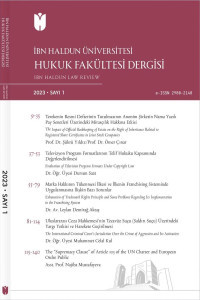The “Supremacy Clause” of Article 103 of the UN Charter and European Ordre Public
This article examines the “supremacy clause” of Article 103 of the United Nations (UN) Charter that forces the obligations under the Charter above other treaty duties, consequently backing the UN`s target to universality and preponderance among other international legal regimes. However, the author argues that regional international organizations have the equal right to claim the autonomy of their ordre public. Through the scrutiny of the relevant cases of the European Court of Human Rights (ECtHR), it is affirmed in this paper that the European public order implicitly recognizes the “supremacy clause” of article 103 that virtually proclaims the hierarchy of the UN among international organizations. At the same time, it is asserted that article 103 does not intentionally allow the UN to set aside other treaty obligations of its member states and in particular, in the area of human rights. In this regard, the “harmonious interpretation” which was chosen by the ECtHR in the analyzed cases is evaluated as a wise compromise that aims to retain the autonomous nature of different legal regimes from one side, as well as to guard a unique historical mission of the UN that is primarily responsible for maintenance of international peace and security, from another.
Anahtar Kelimeler:
supremacy clause, UN Charter, ECtHR, regime interaction, human rights
The “Supremacy Clause” of Article 103 of the UN Charter and European Ordre Public
This article examines the “supremacy clause” of Article 103 of the United Nations (UN) Charter that forces the obligations under the Charter above other treaty duties, consequently backing the UN`s target to universality and preponderance among other international legal regimes. However, the author argues that regional international organizations have the equal right to claim the autonomy of their ordre public. Through the scrutiny of the relevant cases of the European Court of Human Rights (ECtHR), it is affirmed in this paper that the European public order implicitly recognizes the “supremacy clause” of article 103 that virtually proclaims the hierarchy of the UN among international organizations. At the same time, it is asserted that article 103 does not intentionally allow the UN to set aside other treaty obligations of its member states and in particular, in the area of human rights. In this regard, the “harmonious interpretation” which was chosen by the ECtHR in the analyzed cases is evaluated as a wise compromise that aims to retain the autonomous nature of different legal regimes from one side, as well as to guard a unique historical mission of the UN that is primarily responsible for maintenance of international peace and security, from another.
Keywords:
supremacy clause, UN Charter, ECtHR, regime interaction, human rights,
___
- Bernhardt, Rudolf. “Article 103”, Charter of the United Nations - A Commentary (ed.), B.Simma, 2nd edition, Vol. 2, Oxford, 2002.
- Conforti Benedetto, “Consistency among Treaty Obligations”, in Enzo Cannizzaro (ed.), The Law of Treaties Beyond the Vienna Convention, Oxford University Press.
- Gowlland-Debbas Vera “The Limits of Unilateral Enforcement of Community Objectives in the Framework of UN Peace Maintenance”, EJIL, Vol. 11, 2000.
- Hernandez, Gleider, International Law, Oxford University Press, 2019.
- Istrefi, Kushtrim “The Application of Article 103 of the United Nations Charter in the European Courts: the Quest for Regime Compatibility on Fundamental Rights”, European Journal of Legal Studies, Vol. 6, Issue 2, 2012.
- Kelsen, Hans, The Law of the United Nations: A Critical Analysis of Its Fundamental Problems, Frederick A. Praeger, 1950.
- Kolb, Robert “Does Article 103 of the Charter of the United Nations apply only to decisions or also to authorizations adopted by the Security Council?” Zeitschrift für auslandisches öffentliches Recht and Völkerrecht, Vol. 64, no 1, 2014.
- Lauterpacht, Hersch. “The development of the law of international organizations by the decisions of international tribunals”. 52 Recueil des Cours, 1976.
- Lauwaars, Richard. “The Interrelationship between United Nations Law and the Law of other International Organizations”, Michigan Law Review, Vol. 82, 1984.
- Liivoja, Rain. “The scope of the supremacy clause of the United Nations Charter”, The International and Comparative Law Quarterly, Vol. 57, 2008.
- Megret, Frederic. “Nature of obligations”, in Daniel Moeckli, Sangeeta Shah & Sandesh Sivakumaran (eds.), International Human Rights Law. Oxford University Press, 3rd edition, 2018.
- Milanovic, Marko. “Al-Skeini and Al-Jedda in Strasbourg”, EJIL, Vol. 23, No 1, 2012.
- Milanovic, Marko. “European Court Decides Al-Skeini and Al-Jedda”, EJIL: TALK, 2011, https://www.ejiltalk.org/european-court-decides-al-skeini-andal-jedda/. (access: 12.04.2023) Milanovic, Marko. “European Court Decides Nada v. Switzerland”, EJIL: TALK, 2012, https://www.ejiltalk.org/european-court-decides-nada-v-switzerland/ (access: 12.04.2023)
- Milanovic, Marko. Grand Chamber Judgment in Al-Dulimi v. Switzerland, EJIL: TALK, 2016, https://www.ejiltalk.org/grand-chamber-judgment-in-al-dulimiv-switzerland/#more-14398 (access: 12.04.2023)
- Paust, Jordan. “Peacemaking and Security Council Powers: Bosnia-Herzegovina raises international and constitutional questions”, Southern Illinois University, 1994.
- Peters, Anne. “The New Arbitrariness and Competing Constitutionalisms: Remarks on ECtHR Grand Chamber Al-Dulimi”, EJIL: TALK, 2016 https:// www.ejiltalk.org/the-new-arbitrariness-and-competing-constitutionalisms-remarks-on-ecthr-grand-chamber-al-dulimi/ (access: 12.04.2023)
- Thienel, Tobias. “Nada v Switzerland: The ECtHR Does Not Pull a Kadi (But Mandates It for Domestic Law)”, Invisible College, 2012, https://invisiblecollege.weblog.leidenuniv.nl/2012/09/12/nada-v-switzerland-the-ecthr-does-not-pu/. (access: 12.04.2023)
- Tzanakopulos, Antonios. “Collective Security and Human Rights”, in Erika de Wet and Jure Vidmar (eds.), Hierarchy in international law: the place of human rights, Oxford University Press, 2012.
- Watson, Geoffrey. Constitutionalism, Judicial Review, and the World Court, Harvard International Law Journal, 1, 1993.
- Başlangıç: 2023
- Yayıncı: İbn Haldun Üniversitesi
